By Lucy Komisar
This riveting 1937 play is a combination of Brechtian social criticism and Ionesco political allegory, both propos for a surreal story about Nazi era Europe.
The events created by Odon von Horv¡th, the Austro-Hungarian playwright and novelist, are directed smartly by Richard Jones.
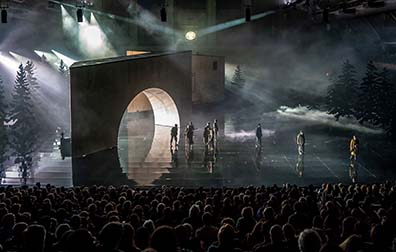
When he wrote the play, in German, he had been expelled by the Hitler regime. There‘s a sense of German gothic.
The play is presented in the armory‘s 55,000-square-foot Drill Hall where Paul Steinberg‘s set of massive light plywood blocks on a glistening black floor create both spaces and barricades for a small Austro-Hungarian town in 1933. The railroad station ticket window is built into a huge beige wall.
The story revolves around two couples, the stationmaster Thomas Hudetz (Luke Kirby) and his wife (Alyssa Bresnahan), who – and this counts in pre-feminist times – is 13 years older than him. We must assume that leaves him open to the blandishments of younger women.
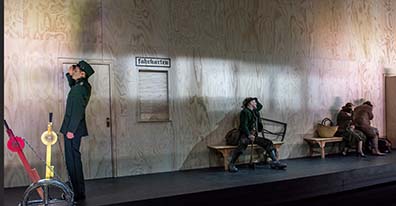
She is Anna (Suzannah Perkins), the innkeeper‘s daughter, who is engaged to Ferdinand, the butcher (Alex Breaux).
But it is also about crowds.
There is discontent in the small town, they are downsizing, They are “telling people to go to hell” a traveling salesman (Jason O‘Connell) complains. There‘s also some misogyny. He says, “Women bring you into the world and then they kill you.”
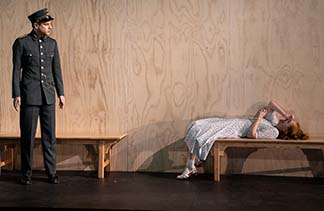
Seductive Anna asks the stationmaster why he won‘t see her. He is married. He rebukes her for saying his older wife will be angry: “When you offend people, you pay a price.”
We notice the sound and light of trains passing. The set moves. She distracts him. Tragedy. He doesn‘t give the signal to allow the trains to pass safely. They collide.
There are 18 dead, more injured. The events are intriguingly choreographed. He is arrested and there is stylized justice. Hudetz seems more ethereal than real.
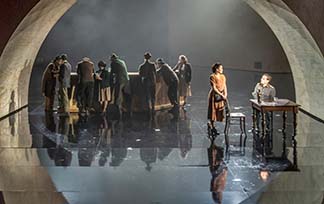
Through an arch you see a bar and glasses. The waitress Leni (Jeena Yi) tells him, “They will beat you till you bleed.”
Anna lies about what happened. His wife knows the truth, but she is scorned by the locals. Then Anna disappears, and people shift their views. Maybe she was harmed by her conscience. That you didn‘t set the signal in time. Or that she‘s been murdered by gypsies hanging around.
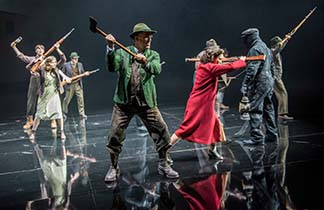
There is jazzy theatrical horn blowing, and smoke. The horrific citizens walk slowly by. They will become a charging mob. A phalanx of citizens with rifles out, their goal “justice on this earth.”
In this parable about who is responsible, you see the distortion of truth, how people lie about innocence and guilt. When Hudetz and Anna meet under the aqueduct, they need to come to judgment.

Jones directs the accomplished cast to focus on what they represent in the story rather than as flesh-and-blood people you might see on the modern naturalistic stage.
This important play by Von Horv¡th, who tragically died at 36, suggests he would have been a worthy member of the Brecht-Ionesco political playwrights group.
“Judgment Day.” Written by Odon von Horv¡th, adapted by Christopher Shinn, directed by Richard Jones. Park Avenue Armory, 643 Park Ave., New York City. 212-933-5812. Opened Dec 11, 2019; closes Jan 10, 2020. Runtime 1:30. 12/21/19. Also on NY Theatre Wire.

